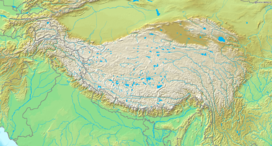Sia Kangri
| Sia Kangri | |
|---|---|
|
Tripoint of territory controlled by India, China and Pakistan
|
|
| Highest point | |
| Elevation | 7,442 m (24,416 ft) Ranked 63rd |
| Prominence | 640 m (2,100 ft) |
| Coordinates | 35°39′49″N 76°45′42″E / 35.66361°N 76.76167°ECoordinates: 35°39′49″N 76°45′42″E / 35.66361°N 76.76167°E |
| Geography | |
| Location | India – Pakistan – China |
| Parent range | Baltoro Muztagh |
| Climbing | |
| First ascent | 1934 by the International Himalaya Expedition led by Günther Dyhrenfurth |
Sia Kangri (7,442 m, 24,370 ft) is a mountain in the Baltoro Muztagh in the Karakoram. Its summit is the tripoint of territory controlled by India, China and Pakistan where the Actual Ground Position Line between Indian and Pakistani forces meets Chinese-controlled territory. Territories on all sides are disputed. The land immediately to the southwest of the peak is claimed by both Pakistan and India and controlled by Pakistan. The land to the northeast is part of the Trans Karakoram Tract, controlled by China under a 1963 border agreement with Pakistan but claimed by India. The land to the southeast is claimed by Pakistan and India, but controlled by India, as a part of its Siachen glacier territory. It is the 63rd highest mountain in the world, and the 25th highest in Pakistan. The peak is on the watershed between the Indus River basin and the Tarim Basin. Indira Col is 3 km to the east. Sia Kangri (24,350 ft) is India’s northernmost point.
Sia Kangri was first climbed in 1934 by the International Himalaya Expedition led by the Swiss/German Günther Dyhrenfurth. The summit party included Hettie Dyhrenfurth, who thereby set the women's world altitude record, which stood for 20 years.
...
Wikipedia

